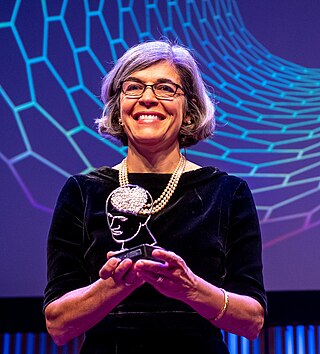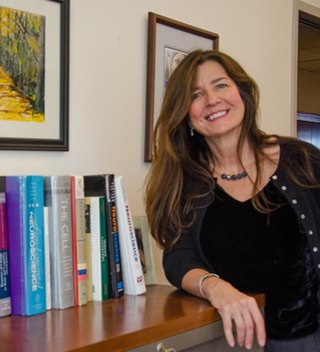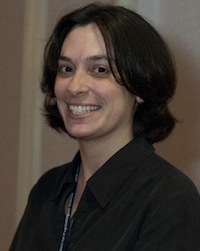The cognitive revolution was an intellectual movement that began in the 1950s as an interdisciplinary study of the mind and its processes, from which emerged a new field known as cognitive science. The preexisting relevant fields were psychology, linguistics, computer science, anthropology, neuroscience, and philosophy. The approaches used were developed within the then-nascent fields of artificial intelligence, computer science, and neuroscience. In the 1960s, the Harvard Center for Cognitive Studies and the Center for Human Information Processing at the University of California, San Diego were influential in developing the academic study of cognitive science. By the early 1970s, the cognitive movement had surpassed behaviorism as a psychological paradigm. Furthermore, by the early 1980s the cognitive approach had become the dominant line of research inquiry across most branches in the field of psychology.

Nancy Gail Kanwisher FBA is the Walter A Rosenblith Professor of Cognitive Neuroscience in the Department of Brain and Cognitive Sciences at the Massachusetts Institute of Technology and a researcher at the McGovern Institute for Brain Research. She studies the neural and cognitive mechanisms underlying human visual perception and cognition.

Adele Dorothy Diamond is a professor of neuroscience at the University of British Columbia, where she is currently a Tier 1 Canada Research Chair in Developmental Cognitive Neuroscience. One of the pioneers in the field of developmental cognitive neuroscience, Diamond researches how executive functions are affected by biological and environmental factors, especially in children. Her discoveries have improved treatment for disorders such as phenylketonuria and attention-deficit hyperactivity disorder, and they have impacted early education.

Anna Christina Nobre FBA, MAE, fNASc is a Brazilian and British cognitive neuroscientist working at Yale University in New Haven, CT, USA.

Nora S. Newcombe is the Laura H. Carnell Professor of Psychology and the James H. Glackin Distinguished Faculty Fellow at Temple University. She is a Canadian-American researcher in cognitive development, cognitive psychology and cognitive science, and expert on the development of spatial thinking and reasoning and episodic memory. She was the principal investigator of the Spatial Intelligence and Learning Center (2006-2018), one of six Science of Learning Centers funded by the National Science Foundation.

Helen J. Neville was a Canadian psychologist and neuroscientist known internationally for her research in the field of human brain development.

Angela Friederici is a director at the Max Planck Institute for Human Cognitive and Brain Sciences in Leipzig, Germany, and is an internationally recognized expert in neuropsychology and linguistics. She is the author of over 400 academic articles and book chapters, and has edited 15 books on linguistics, neuroscience, language and psychology.
Isabel Gauthier is a cognitive neuroscientist, and the David K. Wilson Professor of Psychology and head of the Object Perception Lab at Vanderbilt University’s Department of Psychology. In 2000, with the support of the James S. McDonnell Foundation, she founded the Perceptual Expertise Network (PEN), which now comprises over ten labs based across North America. In 2006 PEN became part of the NSF-funded Temporal Dynamics of Learning Center (TDLC).

Eleanor Anne Maguire is an Irish neuroscientist. Since 2007, she has been Professor of Cognitive Neuroscience at University College London where she is also a Wellcome Trust Principal Research Fellow.

Sophie Kerttu Scott is a British neuroscientist and Wellcome Trust Senior Fellow at University College London (UCL). Her research investigates the cognitive neuroscience of voices, speech and laughter particularly speech perception, speech production, vocal emotions and human communication. She also serves as director of UCL's Institute of Cognitive Neuroscience.
Kathleen McDermott is Professor of Psychological and Brain Sciences at Washington University in St. Louis. She is known for her research on how human memory is encoded and retrieved, with a specific interest in how false memories develop. In collaboration with Henry L. (Roddy) Roediger III, she developed the Deese-Roediger-McDermott paradigm used to study the phenomenon of memory illusions. McDermott received the 2004-2005 F.J. McGuigan Young Investigator Prize for research on memory from the American Psychological Foundation and the American Psychological Association's Science Directorate. She was recognized by the Association for Psychological Science as a Rising Star in 2007. McDermott is a Fellow of the Psychonomic Society and was honored with a 2019 Psychonomic Society Mid-Career Award.
Randall Wayne Engle is an American psychologist and professor of psychology at the Georgia Institute of Technology. Engle is known for his research on working memory, attentional control, and human intelligence. Specifically, his research investigates the nature of working memory, the causes of its limitations, its role in applied cognitive tasks, and the relationships between working memory, cognitive control, and fluid intelligence. His work has received funding from the National Institute of Child Health and Human Development, Air Force Office of Scientific Research, DARPA, and Office of Naval Research. Engle's work has influenced modern theories of cognitive and emotional control, and has had an impact on a number of fields including social psychology, emotion, psychopathology, developmental psychology, and psychological testing. According to Google Scholar, his work has been cited over 48,000 times. Engle is the principal investigator in the Attention & Working Memory Lab at the Georgia Institute of Technology.
Julie A. Fiez is a cognitive neuroscientist known for her research on the neural basis of speech, language, reading, working memory, and learning in healthy and patient populations. She is Professor of Psychology and Neuroscience at the Learning Research and Development Center and the Center for the Neural Basis of Cognition at the University of Pittsburgh. She is also Adjunct Faculty in the Department of Psychology at Carnegie Mellon University.
Suparna Rajaram, SUNY Distinguished Professor of Psychology at Stony Brook University, is an Indian-born cognitive psychologist and expert on memory and amnesia. Rajaram served as Chair of the Governing Board of the Psychonomic Society (2008) and as president of the Association for Psychological Science (2017–2018). Along with Judith Kroll and Randi Martin, Rajaram co-founded the organization Women in Cognitive Science in 2001, with the aim of improving the visibility of contributions of women to cognitive science. In 2019, she was an inaugural recipient of Psychonomic Society's Clifford T. Morgan Distinguished Leadership Award for significant contributions and sustained leadership in the discipline of cognitive psychology.
Social cognitive neuroscience is the scientific study of the biological processes underpinning social cognition. Specifically, it uses the tools of neuroscience to study "the mental mechanisms that create, frame, regulate, and respond to our experience of the social world". Social cognitive neuroscience uses the epistemological foundations of cognitive neuroscience, and is closely related to social neuroscience. Social cognitive neuroscience employs human neuroimaging, typically using functional magnetic resonance imaging (fMRI). Human brain stimulation techniques such as transcranial magnetic stimulation and transcranial direct-current stimulation are also used. In nonhuman animals, direct electrophysiological recordings and electrical stimulation of single cells and neuronal populations are utilized for investigating lower-level social cognitive processes.
Adriana Galván is an American psychologist and expert on adolescent brain development. She is a professor of psychology at the University of California, Los Angeles (UCLA) where she directs the Developmental Neuroscience laboratory. She was appointed the Jeffrey Wenzel Term Chair in Behavioral Neuroscience and the Dean of Undergraduate Education at UCLA.
Denise Hsien Wu (吳嫻) is a professor of neuroscience, the head of the Concept & Language Laboratory, and the chair of the Institute of Cognitive Neuroscience at National Central University, Taiwan.

Betty Jo "BJ" Casey is an American cognitive neuroscientist and expert on adolescent brain development and self control. She is the Christina L. Williams Professor of Neuroscience at Barnard College of Columbia University where she directs the Fundamentals of the Adolescent Brain (FAB) Lab and is an Affiliated Professor of the Justice Collaboratory at Yale Law School, Yale University.

Sabine Kastner is a German-born American cognitive neuroscientist. She is professor of psychology at the Princeton Neuroscience Institute at Princeton University. She also holds a visiting scientist appointment at the University of California at Berkeley.
Nim Tottenham is a professor of psychology at Columbia University, where she leads the Developmental Affective Neuroscience Laboratory. Her research highlighted fundamental changes in amygdala-prefrontal cortex circuitry across childhood and adolescence and the influential role of early experiences on the developmental trajectories of these circuits.










